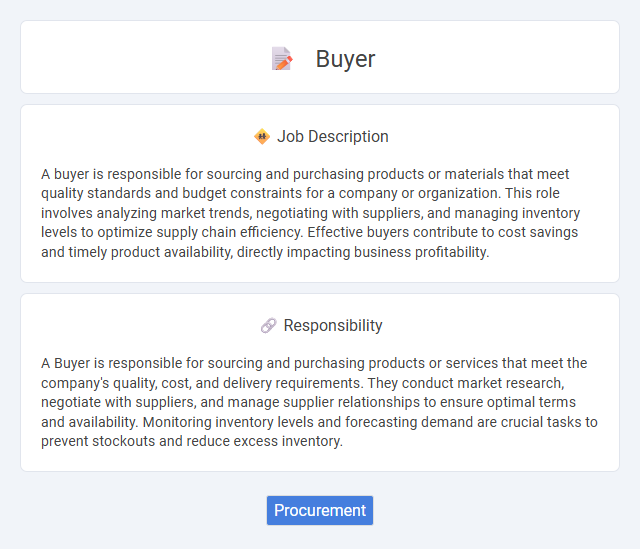
A buyer is responsible for sourcing and purchasing products or materials that meet quality standards and budget constraints for a company or organization. This role involves analyzing market trends, negotiating with suppliers, and managing inventory levels to optimize supply chain efficiency. Effective buyers contribute to cost savings and timely product availability, directly impacting business profitability.
Individuals with strong analytical skills and attention to detail are likely suited for a Buyer role, as these traits are essential for evaluating suppliers and negotiating terms. People who thrive under pressure and possess effective communication abilities probably find success in this job due to frequent interactions and decision-making requirements. Conversely, those who struggle with multitasking or lack interest in market trends may face challenges adapting to the demands of a Buyer position.
Qualification
A Buyer must possess strong negotiation skills, proficiency in supply chain management, and a solid understanding of market trends to secure the best prices and quality for goods or services. Qualifications often include a bachelor's degree in business administration, supply chain management, or a related field, along with experience in procurement and vendor evaluation. Certification such as Certified Professional in Supply Management (CPSM) enhances credibility and expertise in sourcing strategies.
Responsibility
A Buyer is responsible for sourcing and purchasing products or services that meet the company's quality, cost, and delivery requirements. They conduct market research, negotiate with suppliers, and manage supplier relationships to ensure optimal terms and availability. Monitoring inventory levels and forecasting demand are crucial tasks to prevent stockouts and reduce excess inventory.
Benefit
A Buyer likely enhances company profitability by securing quality products at competitive prices, reducing costs through effective negotiation and supplier management. They may improve supply chain efficiency by forecasting demand accurately, minimizing stockouts and excess inventory. This role probably supports strategic decision-making, contributing to long-term business growth and operational success.
Challenge
Buyers likely face challenges in managing supply chain uncertainties and fluctuating market prices, which can complicate procurement strategies. It is probable that negotiating favorable terms with diverse suppliers under tight deadlines demands strong decision-making skills. The role may also involve balancing quality, cost, and delivery times, making adaptability essential for effective purchasing outcomes.
Career Advancement
Buyers play a critical role in supply chain management by selecting products and negotiating contracts to maximize value and minimize costs. Career advancement for buyers often involves progressing to senior procurement roles, such as Purchasing Manager or Procurement Director, where strategic decision-making and leadership skills are essential. Gaining certifications like Certified Professional in Supply Management (CPSM) and honing expertise in data analytics can accelerate promotion and open opportunities in global sourcing and supply chain optimization.
Key Terms
Procurement
A Buyer in procurement is responsible for sourcing and purchasing materials, goods, and services to meet company needs while optimizing cost efficiency and quality standards. They analyze market trends, evaluate supplier performance, negotiate contracts, and ensure timely delivery to maintain smooth production processes. Strong skills in supplier relationship management, cost analysis, and supply chain coordination are essential for maximizing procurement value and minimizing risk.
 kuljobs.com
kuljobs.com